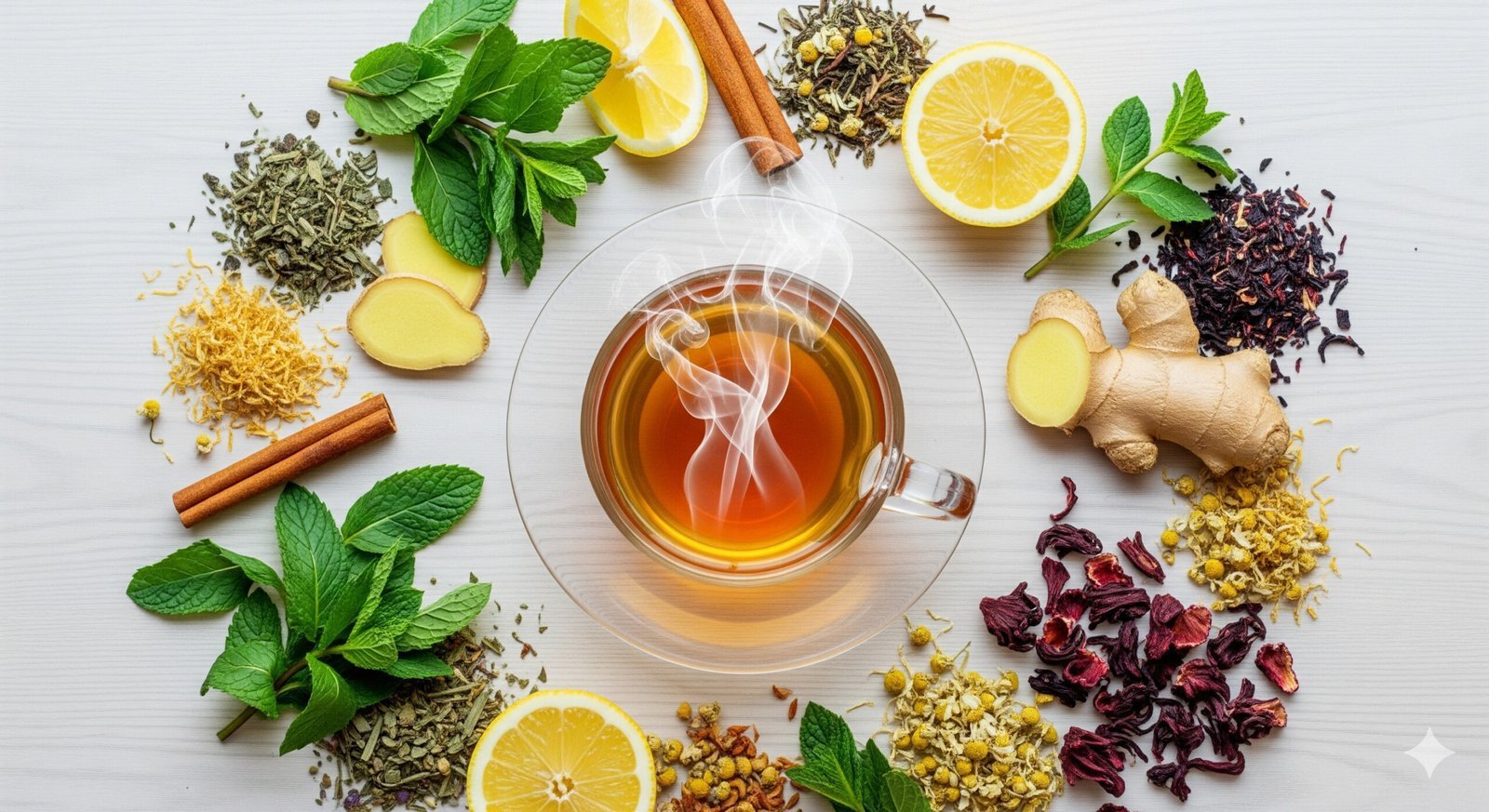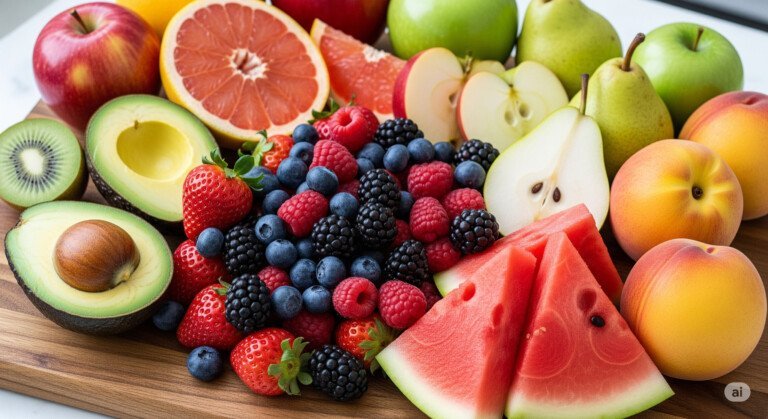The Power of Herbal Teas for Weight Loss
For centuries, cultures around the world have turned to tea for its soothing and medicinal properties. Beyond their comforting warmth and rich flavors, certain brews contain powerful compounds that may support a healthy metabolism and a balanced weight. The world of herbal teas for weight loss is not about magic potions or quick fixes, but about embracing a natural, complementary tool to support your wellness journey.
This guide will explore seven different herbal teas, each with unique properties that can help support your body’s natural processes. We will dive into the science behind how these teas work and discuss how you can incorporate them into a healthy lifestyle. From metabolism-boosting blends to those that help with digestion and hydration, you’ll discover how a simple cup of tea can become a powerful ally in your pursuit of a healthier you.

Understanding Green Tea Fat Burning
Green tea is arguably the most well-known tea for its health benefits, and for good reason. It’s packed with antioxidants and compounds that have been extensively studied for their potential role in metabolism and green tea fat burning.
The key players are:
- Catechins: Specifically, a catechin called EGCG (epigallocatechin gallate) is the primary active ingredient. EGCG is a powerful antioxidant that is thought to have a thermogenic effect, meaning it can cause a slight increase in your body’s calorie-burning rate.
- Caffeine: Green tea contains a small amount of caffeine. While not as much as coffee, this caffeine can provide a gentle energy boost and may work in synergy with EGCG to enhance metabolism.
Together, these two compounds may stimulate fat oxidation, helping your body to use fat for energy. A cup of green tea can serve as a hydrating, low-calorie beverage that can also give your metabolism a slight, natural boost. It’s a great addition to a balanced diet and regular exercise routine.
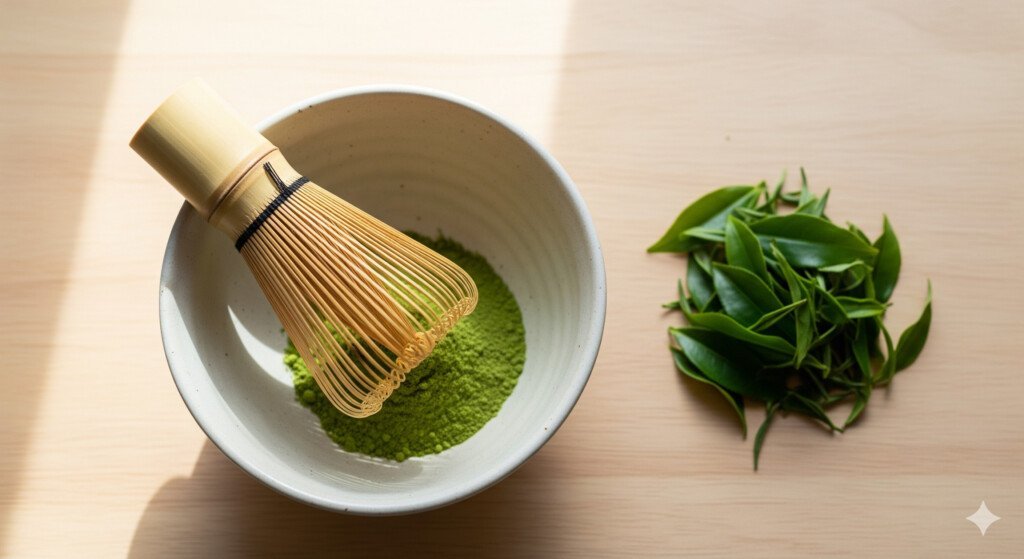
How Oolong Tea Contributes to Weight Loss
Oolong tea, a traditional Chinese tea, falls somewhere between green and black tea in terms of oxidation. It has a unique flavor profile and contains a similar blend of catechins and caffeine as green tea, but with some notable differences that may help with oolong tea weight loss.
- Metabolism Boost: Like green tea, oolong tea’s combination of catechins and caffeine can help increase energy expenditure. Some studies suggest that oolong tea may be particularly effective at boosting metabolism and increasing fat oxidation.
- Fat Mobilization: Research has shown that oolong tea may help the body more efficiently use stored fat for energy. Its unique polyphenols are thought to activate certain enzymes that are key to breaking down fat.
Adding a cup of oolong tea to your daily routine can be a simple way to support your metabolism and promote fat burning. It’s a flavorful alternative to sugary drinks and can be a great way to stay hydrated throughout the day.
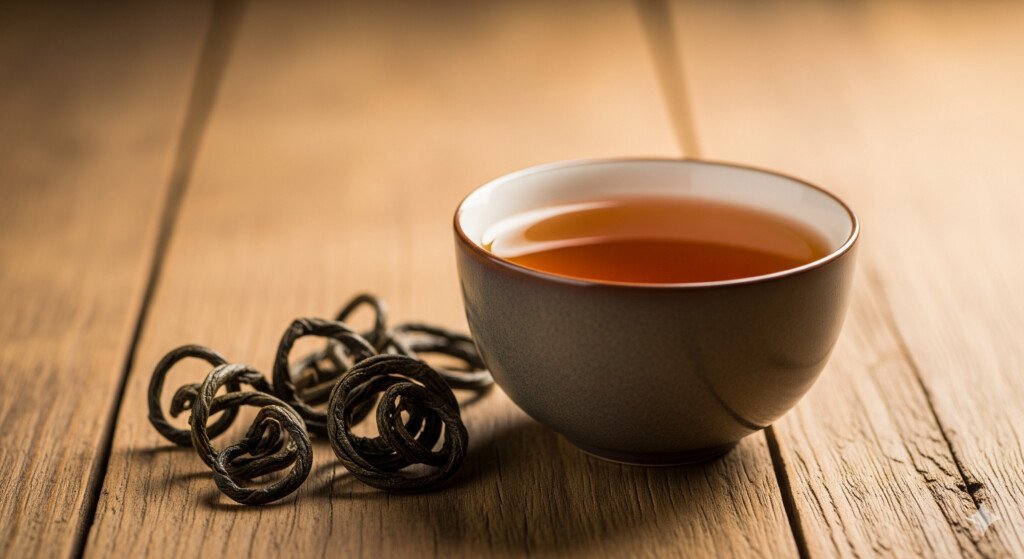
The Link Between Chamomile Tea and Metabolism
When you think of chamomile tea, you likely think of a calming, soothing beverage that helps with sleep and relaxation. While it is indeed excellent for unwinding, there is a growing body of research exploring the link between chamomile tea and metabolism.
- Stress Reduction: One of the biggest obstacles to weight loss is chronic stress. High levels of the stress hormone cortisol can lead to increased appetite and fat storage, particularly in the abdomen. Chamomile tea’s calming properties can help lower cortisol, thereby indirectly supporting a healthy metabolism and preventing stress-related weight gain.
- Improved Sleep: A lack of quality sleep can wreak havoc on your metabolism and hormones, increasing hunger hormones and making it harder to lose weight. By promoting restful sleep, chamomile tea helps your body regulate these crucial processes, supporting your weight loss efforts.
- Blood Sugar Control: Some studies suggest that chamomile may help with blood sugar control, which is vital for preventing fat storage and managing cravings.
While chamomile won’t provide a direct metabolic boost, its role in supporting restful sleep and stress management makes it a powerful ally for anyone on a wellness journey.

Using Ginger Tea for Belly Fat
Ginger is a popular spice known for its potent flavor and anti-inflammatory properties. In the context of weight loss, ginger is particularly well-known for its potential to help with digestion and to combat inflammation. This is where ginger tea for belly fat comes into play.
- Digestion: Ginger is a well-known digestive aid. A healthy digestive system is crucial for overall wellness and can indirectly support weight loss by improving nutrient absorption and reducing bloating.
- Thermogenesis: Some research suggests that ginger has a thermogenic effect, meaning it can slightly increase the amount of calories you burn. This small but consistent boost can add up over time.
- Appetite Control: Ginger may help you feel fuller for longer, which can lead to a natural reduction in calorie intake.
Drinking a warm cup of ginger tea before or after a meal can aid digestion and contribute to a feeling of fullness. It’s a simple, natural way to support your body’s fat-burning processes. You can find more of our tips on holistic wellness in our holistic-healing guides.
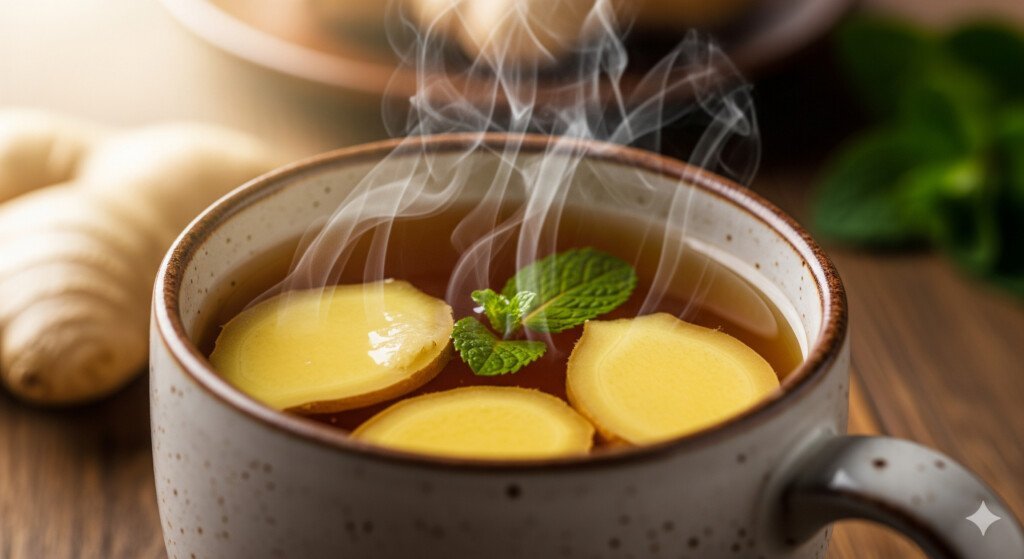
Can Cinnamon Tea Aid in Fat Loss?
Cinnamon is a delicious spice that has been used for centuries for its flavor and medicinal properties. While it won’t magically burn fat, there is a lot of interest in whether cinnamon tea can aid in fat loss by influencing how the body manages blood sugar.
- Blood Sugar Regulation: Cinnamon has been shown in some studies to improve insulin sensitivity and help regulate blood sugar levels. When your blood sugar is stable, you are less likely to experience cravings and energy crashes, which can lead to overeating.
- Metabolism Support: A stable blood sugar level is also crucial for a healthy metabolism. When your blood sugar spikes and crashes, your metabolism can be negatively impacted. By helping to keep it steady, cinnamon supports your body’s ability to burn fat more efficiently.
- Appetite Management: The warm, sweet flavor of cinnamon can also help curb sugar cravings, making it a great alternative to high-calorie sweets and sugary drinks.
Brewing a cup of cinnamon tea or adding cinnamon to your food can be a simple, flavorful way to support your metabolic health and manage cravings.

A Guide to Healthy Detox Tea Recipes
The term “detox tea” can be misleading, as the body has its own powerful detoxification system (the liver and kidneys). However, detox tea recipes often contain ingredients that can support your body’s natural functions, aid digestion, and promote hydration. They can be a great, low-calorie way to cleanse and refresh.

Popular detox ingredients often include:
- Lemon: Rich in Vitamin C, lemon water helps with hydration and can support liver function.
- Dandelion Root: This is a gentle diuretic that can help reduce water retention and bloating.
- Peppermint: Great for soothing digestion and reducing bloating and gas.
- Green Tea: As we’ve discussed, it has metabolism-boosting properties.
Creating your own detox tea at home is a great way to stay hydrated and nourish your body with powerful antioxidants and compounds. It’s a proactive step toward a healthier lifestyle.

The Synergy of Herbal Teas and a Healthy Lifestyle
The true power of herbal teas for weight loss lies in their synergy with a healthy lifestyle. No tea, no matter how potent, can replace the fundamental pillars of a healthy diet and consistent exercise.
- Hydration: Many people mistake thirst for hunger. Drinking tea is a flavorful way to stay hydrated throughout the day, which can help you manage your appetite and support a healthy metabolism.
- Mindful Ritual: The simple act of brewing and sipping a cup of tea can be a mindful ritual. It encourages you to slow down, connect with your body, and make a conscious, healthy choice. This can help combat emotional eating and stress-related weight gain.
- Nutrient Support: The vitamins, minerals, and antioxidants in these teas can provide minor, but meaningful, support for your body’s metabolic and digestive functions.
When used intelligently and as part of a holistic plan, these teas can provide a small, yet meaningful, boost to help you reach your goals. They are best used to optimize what you are already doing right.

Final Takeaway: Embrace the Power of a Simple Cup
The journey to a healthier you is full of small, intentional choices. While the world of herbal teas for weight loss is not a magic solution, it is a valuable part of a holistic approach. By making a simple cup of tea a regular part of your routine, you are choosing to hydrate, nourish your body, and embrace a healthier lifestyle. Your journey to wellness is waiting.
FAQ
1: Do detox teas make you lose weight?
Detox teas may cause temporary weight loss due to a reduction in water weight and bloating from their diuretic properties. However, they do not lead to significant, long-term fat loss.
2: How much tea do I need to drink to see results?
There is no magic number. Drinking 2-3 cups of green tea per day, for example, can be beneficial. The most important thing is consistency and incorporating the tea into a healthy lifestyle.
3: Can I drink these teas with supplements?
Yes, in most cases. However, it’s always a good idea to consult with a healthcare professional to ensure there are no contraindications with any specific supplements or medications you are taking.
4: Do these teas have calories?
Most herbal teas brewed from loose leaves or tea bags have virtually zero calories. Adding sugar, honey, or milk will add calories.
5: Should I drink tea before or after a meal for weight loss?
Drinking a cup of tea before a meal can help fill you up and manage portion sizes. Drinking it after a meal can aid digestion and prevent cravings. It’s about finding what works best for your body and your routine.
Disclaimer:
This post may contain affiliate links. If you purchase through them, we may earn a small commission at no extra cost to you. Also, this content is for informational purposes only and does not substitute professional medical advice.

